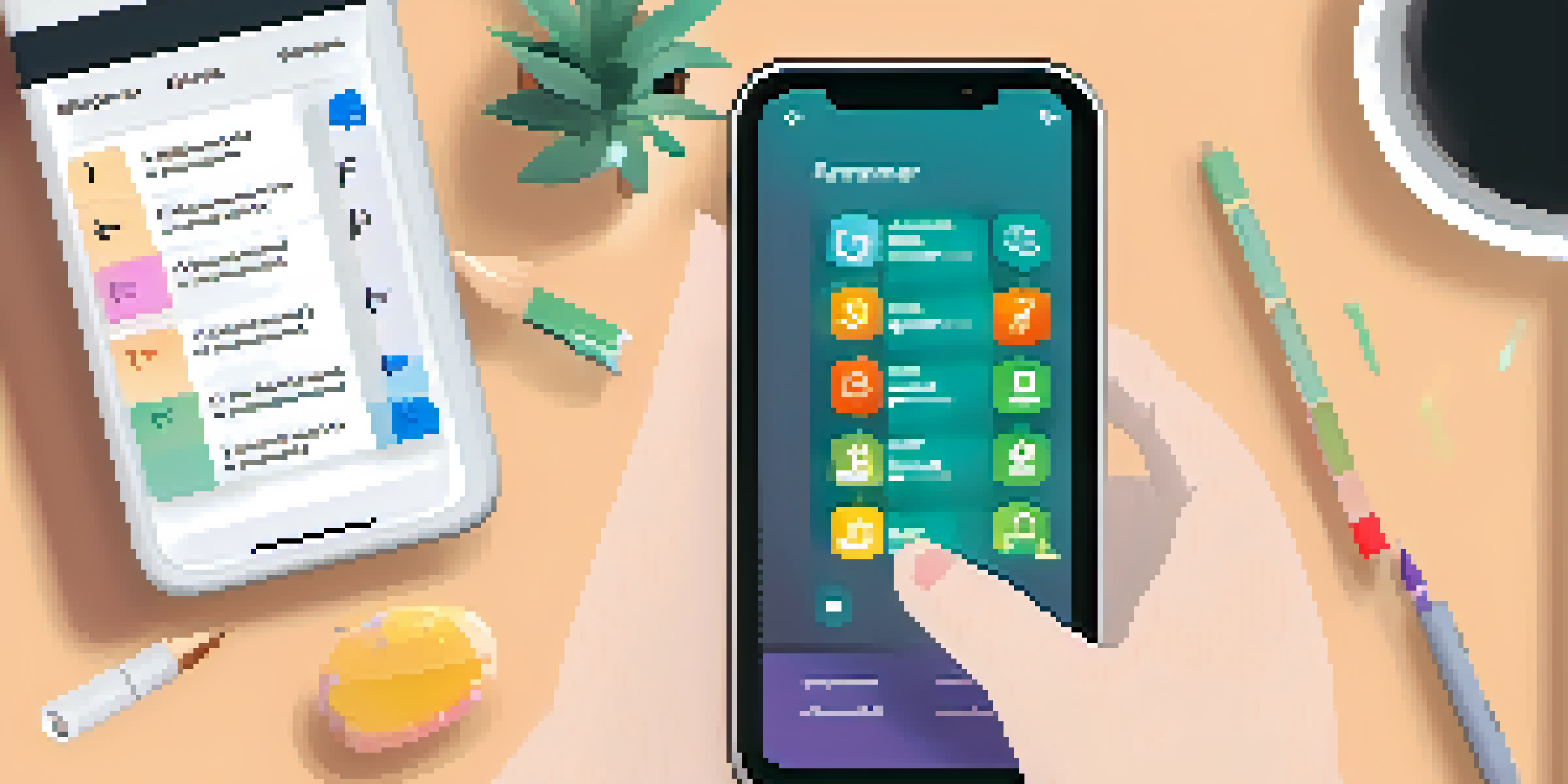The Importance of Self-Regulation in Remote Learning

Understanding Self-Regulation in Education
Self-regulation refers to the ability to manage your emotions, thoughts, and behaviors in different situations. In the context of education, it means students can set goals, monitor their progress, and adjust their strategies as needed. This skill is especially crucial in remote learning environments, where traditional classroom cues and structures are often absent.
Self-regulation is not just about managing your time; it's about managing your emotions, thoughts, and behaviors to achieve your goals.
Imagine going to a gym without a trainer. Without self-regulation, you might skip workouts or lose focus easily. In a similar vein, students learning from home must cultivate self-discipline to stay on track with their studies and keep distractions at bay.
In essence, self-regulation empowers students to take charge of their learning journey. It encourages them to create routines, establish prioritization, and ultimately take ownership of their educational outcomes, which is vital in a remote setting.
The Challenges of Remote Learning
Remote learning presents unique challenges that can hinder a student's academic progress. Without the physical presence of teachers and peers, students may feel isolated, leading to disengagement. Moreover, the home environment can be filled with distractions, making it difficult for students to concentrate on their studies.

For instance, a student might find it tempting to scroll through social media instead of focusing on a lecture. This scenario illustrates how easily one can deviate from their learning objectives without a solid self-regulation strategy in place.
Self-Regulation Fuels Learning Success
Self-regulation enables students to manage their goals and strategies effectively, particularly in remote learning environments.
Recognizing these challenges is the first step toward overcoming them. By developing self-regulation skills, students can better navigate the complexities of remote learning and maintain their motivation and focus.
Building Self-Regulation Skills
Building self-regulation skills is akin to developing a muscle; it requires practice and consistency. Students can start by setting clear goals for their learning, breaking tasks into smaller, manageable chunks. This approach not only makes the workload feel less overwhelming but also allows for easier tracking of progress.
The ability to manage your time effectively is a key component of self-regulation and can make the difference between success and failure.
Another effective strategy is to create a dedicated study environment. A designated workspace can signal to the brain that it's time to focus, minimizing distractions. This simple change can significantly boost one’s ability to self-regulate during online classes or study sessions.
Lastly, regular self-reflection can enhance self-awareness. By taking time to assess what methods work best and where they struggle, students can refine their strategies and improve their self-regulation over time.
The Role of Time Management
Time management is a fundamental aspect of self-regulation that directly affects learning outcomes. In a remote learning setting, students are often responsible for creating their schedules, which can be both empowering and daunting. Effective time management helps them allocate sufficient time for studies, breaks, and leisure activities.
Consider a student who plans their week in advance, setting designated study blocks and incorporating breaks. This structured approach not only reduces procrastination but also fosters a sense of accomplishment as they check off completed tasks, reinforcing their self-regulatory skills.
Time Management Enhances Focus
Effective time management empowers students to create structured schedules, reducing procrastination and boosting academic performance.
In contrast, poor time management can lead to last-minute cramming and increased stress. By honing their time management abilities, students can enhance their overall learning experience and achieve better academic results.
Motivation and Self-Regulation
Motivation plays a critical role in self-regulation, acting as the driving force behind a student's actions. Intrinsic motivation, which comes from within, often leads to a more profound commitment to learning. When students are genuinely interested in a subject, they are more likely to engage in self-regulatory behaviors, such as setting goals and monitoring their progress.
For example, a student passionate about science might take the initiative to explore additional resources beyond their assigned coursework. This proactive approach not only deepens their understanding but also reinforces their self-regulation skills as they take charge of their learning.
Conversely, a lack of motivation can stifle self-regulation. Students may struggle to focus or find the drive to complete assignments, underscoring the importance of fostering motivation alongside self-regulatory practices.
Using Technology to Aid Self-Regulation
Technology can be a powerful ally in developing self-regulation skills during remote learning. Various apps and tools are designed to help students organize their tasks, set reminders, and track their progress. For instance, a task management app can assist students in visualizing their workload, making it easier to prioritize assignments.
Moreover, online calendars can be invaluable for scheduling study sessions and managing deadlines. By integrating these technological resources, students can create a structured environment that promotes self-regulation and accountability.
Motivation Drives Self-Regulatory Skills
Intrinsic motivation plays a crucial role in self-regulation, encouraging students to take initiative and engage deeply in their learning.
However, it's essential to strike a balance. While technology can enhance self-regulation, it's crucial to avoid distractions from social media or gaming. Encouraging mindful use of technology can help students harness its benefits while staying focused on their educational goals.
The Benefits of Self-Regulation Beyond Academics
Self-regulation extends beyond academics, impacting various facets of a student's life. The skills developed through self-regulation—like goal setting, time management, and emotional control—are invaluable in personal and professional realms. For instance, a student who learns to manage their time effectively will likely excel in future job settings.
Additionally, self-regulation fosters resilience. Students who can adapt their strategies and persevere through challenges are better equipped to handle setbacks in life. This resilience not only enhances academic performance but also builds character and prepares them for real-world situations.

Ultimately, the benefits of self-regulation are far-reaching. By cultivating these skills during remote learning, students lay a strong foundation that will serve them well in all areas of life, long after they've left the classroom.